Installation
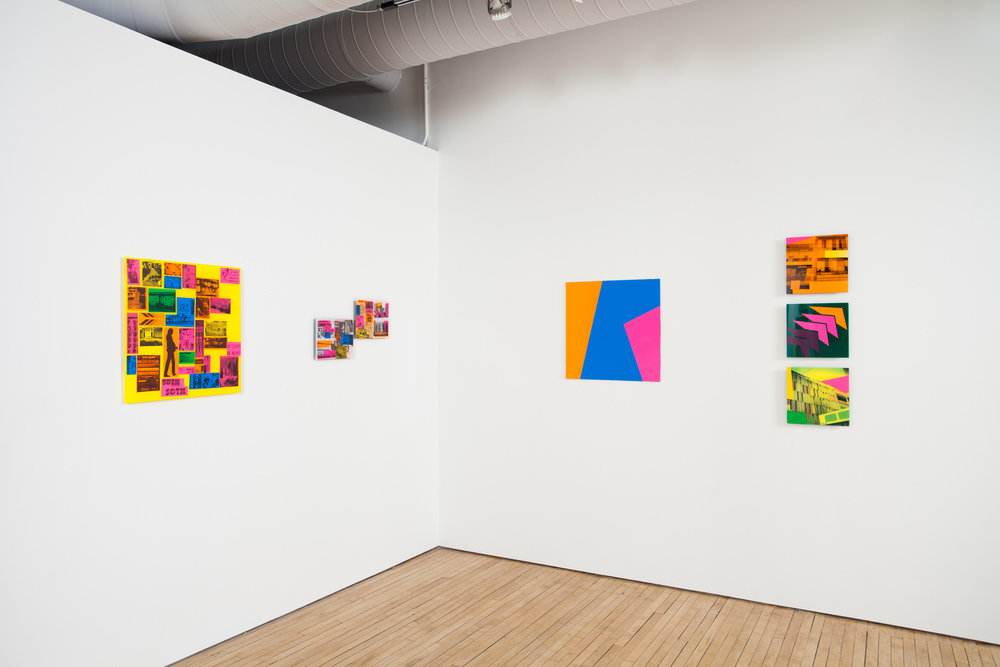
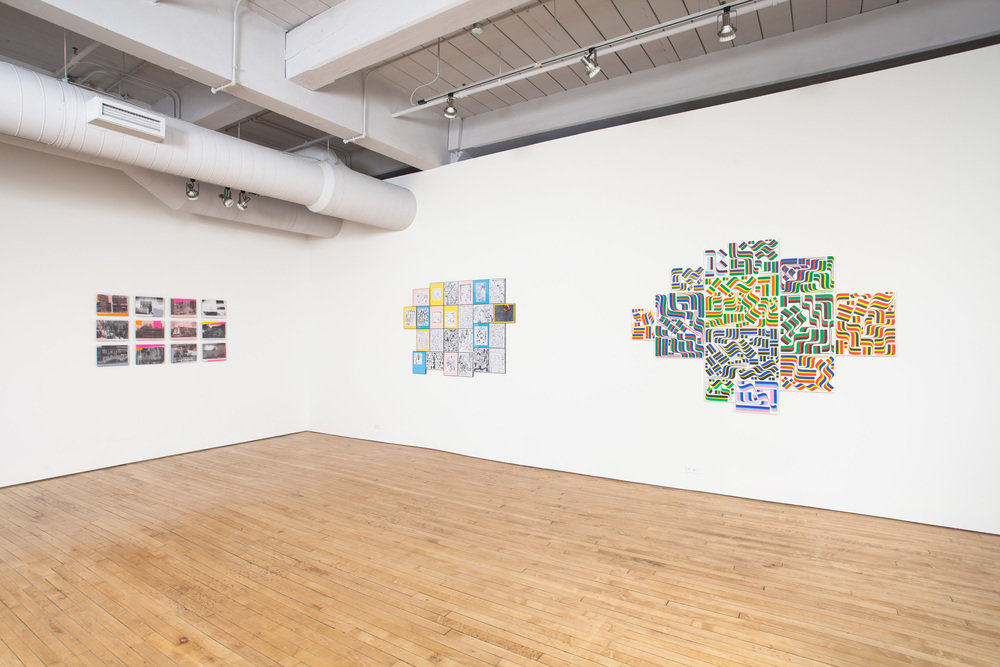
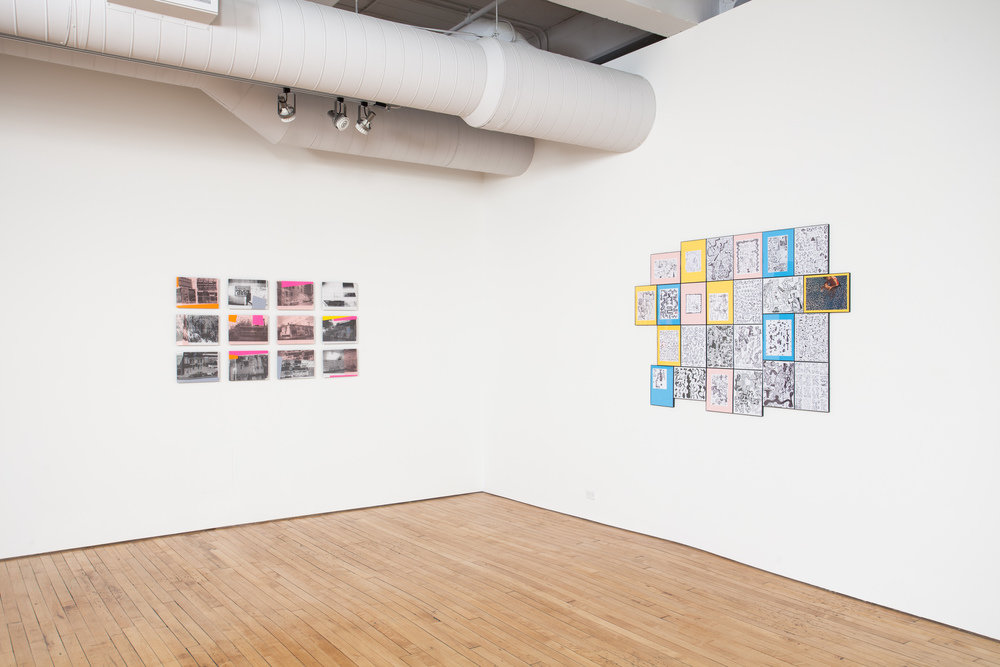
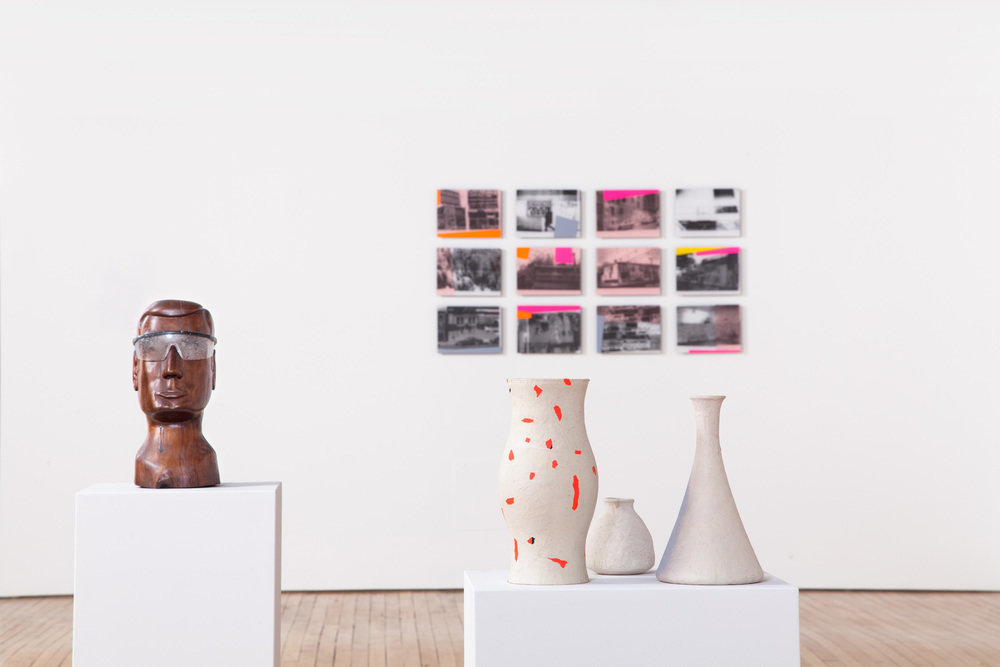
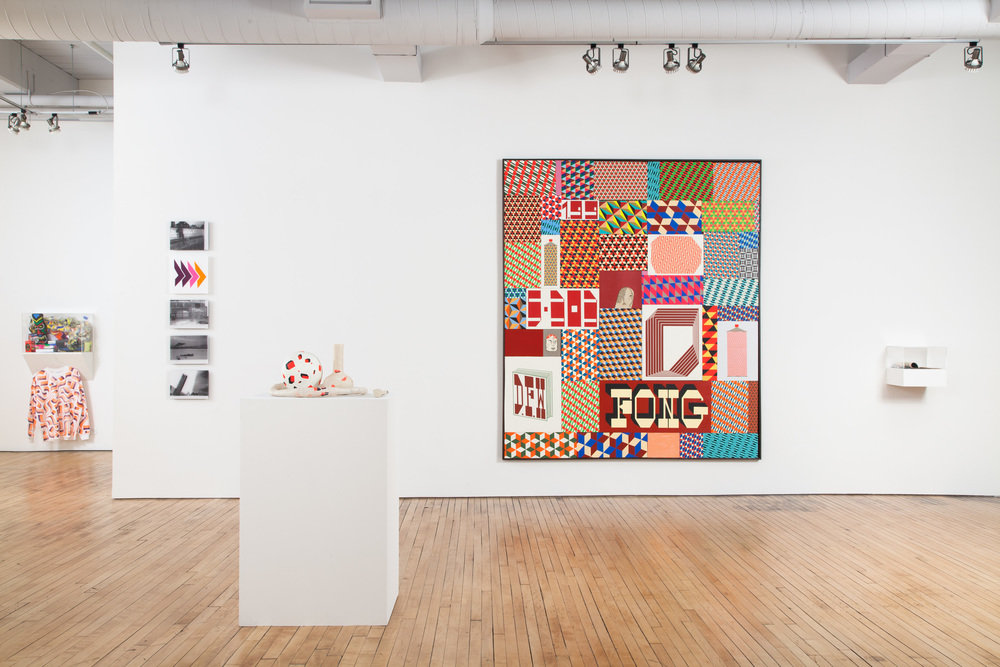
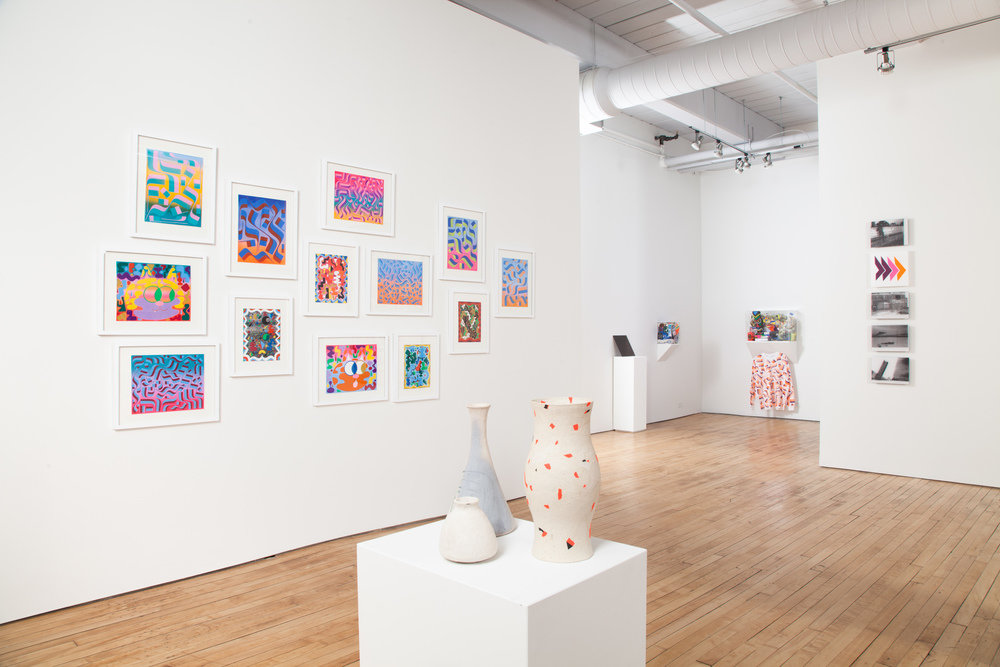
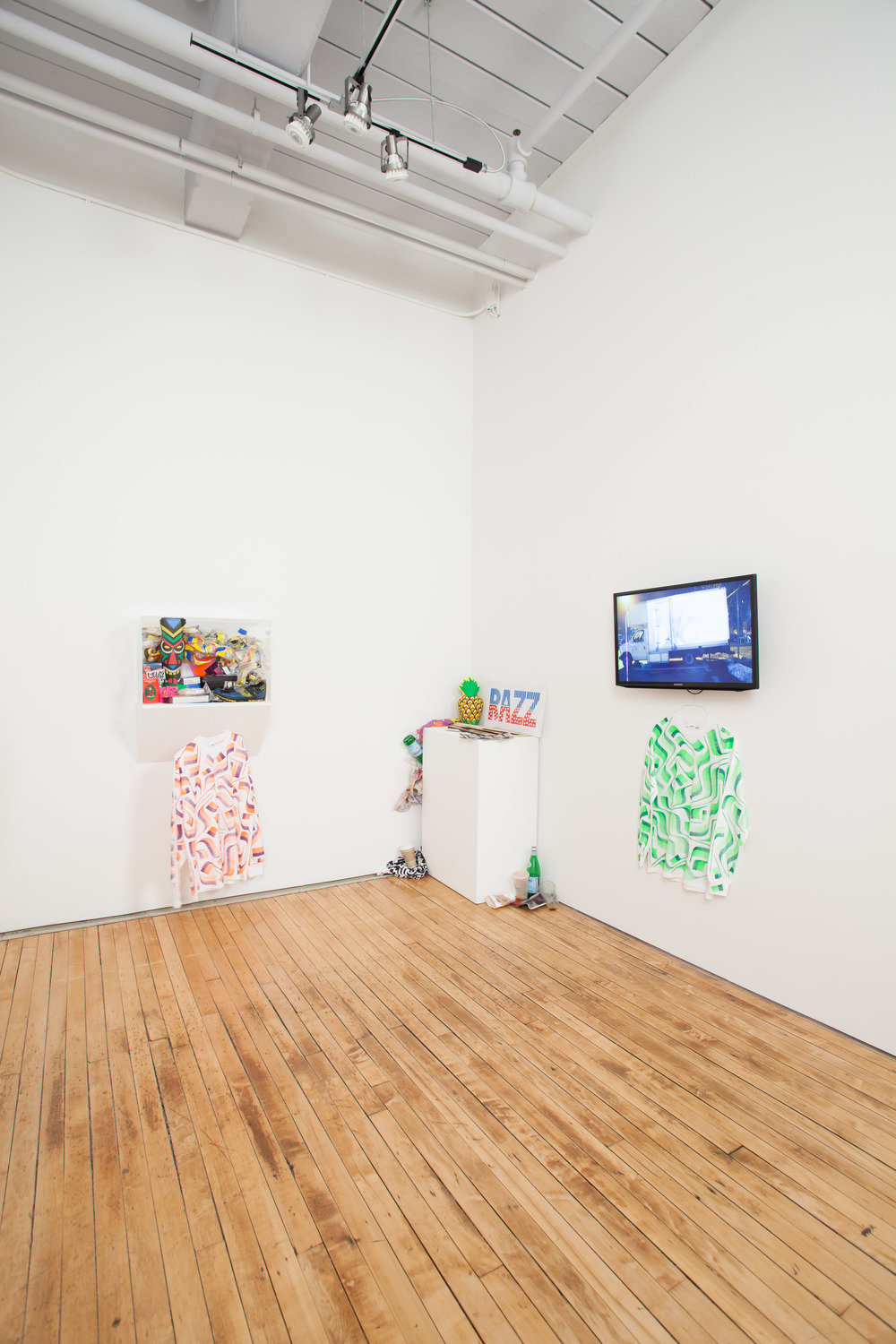
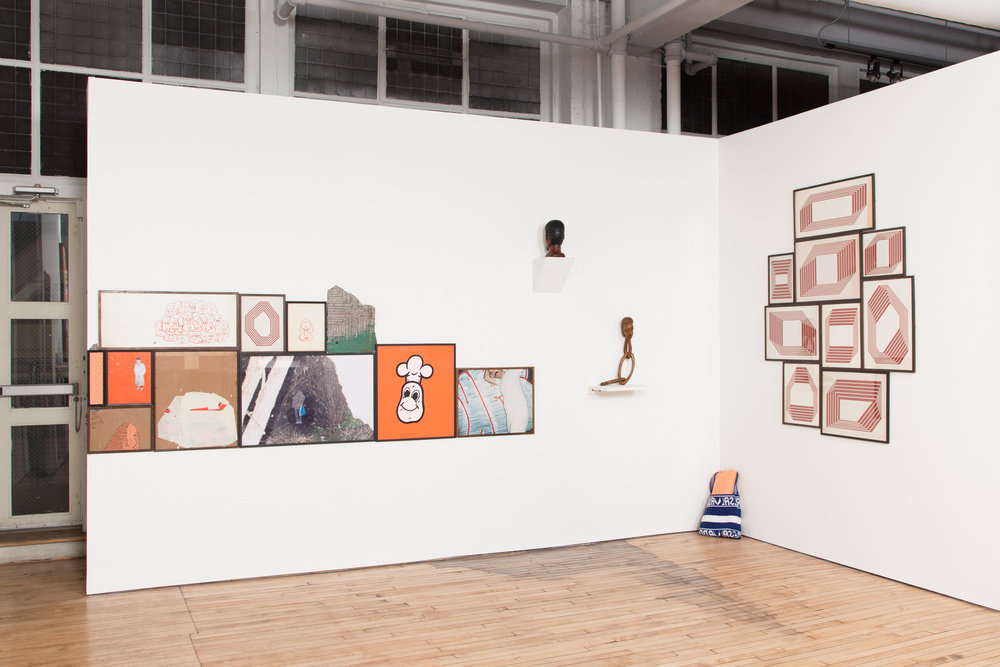
Apr 11 — Jun 07, 2014
Featuring work by: Isaac Tin Wei Lin, Barry McGee, Dan Murphy
Fleisher/Ollman is pleased to announce Department of Neighborhood Services, a three-person exhibition with Isaac Tin Wei Lin, Dan Murphy (both live and work in Philadelphia), and Barry McGee (lives and works San Francisco). The artists have been familiar with one another’s work for over a decade, having shown or collaborated together in a number of contexts including exhibitions, publications, and in the public realm. All have an interest in graffiti through direct involvement in marking outdoor surfaces, documenting it photographically, respecting its history and traditions, and incorporating graffiti’s energy and sensibility into their work.
Using paint and ink, Isaac Tin Wei Lin (b. 1976) overlays calligraphic forms on a variety of materials including enlarged family photographs, vinyl tarps, rain ponchos, shirts, walls, panels, and found paper. Lin’s dense patterns—a kind of graffiti of the imagination where form trumps identifiable lettering—spring like benevolent viruses or kudzu vines covering anything within reach. Accentuating the density of kudzu, Lin often installs his art on similarly painted walls, creating overwhelming, buzzing environments where no surface is safe from visual cacophony. While at first glance Lin seems to prefer the grand gesture, on careful inspection he rewards the viewer with more subtle, measured experiences like small paintings on paper that recall 20th century abstraction by artists including Miro, Kandinsky, Gorky, and Gottlieb. Occasionally Lin will borrow from a certain strain of graffiti an emphasis on characters. Lin’s cartoon-like figures are usually cats that reference iconic felines from the comic pantheon and appear as mascots integrated into the screen of Lin’s abstract gestures--even they cannot escape the artist’s desire to enrobe all available surfaces in veils of pattern.
Dan Murphy (b. 1975) has been a keen observer of the urban environment through many years of graffiti writing. As a partner (with Anthony Smyrski) in the creative platform Megawords, Murphy has parlayed a sustained engagement with graffiti into a visual anthropology of city life where interest lies not in the conspicuous consumption and market driven ethos of the 21st century metropolis, but in self-actualization and the reclamation of narratives in opposition to the dominance of private enterprise. Emphasizing that the city is not just a theme park for the wealthy, Megawords works with artists in producing publications; non-profit, renegade, pop-up storefronts; and other urban interventions as a counterpoint to shop-til-you drop capitalist urbanism. For Department of Neighborhood Services, Murphy erodes and alters his own photographs of blighted neighborhoods, jerry-rigged architecture, and graffiti vandals in action by photocopying images and mounting them to plexiglass--an interesting frisson of the decrepit and the slick. Murphy’s experience as a professional sign painter (working at Steve Powers’ ICY Signs) also shines through in a group of color vinyl abstractions adhered to opaque plastic, conjuring the low-budget advertising of bygone eras.
Barry McGee (b. 1966) has inhabited the two distinct worlds of graffiti and gallery-based art for over two decades, advocating a kind of graffiti that even the art world does not like: tags inscribed illicitly on urban surfaces. While he demands a return to hardcore graffiti vandalism kept safely in the streets where it belongs, in his gallery art McGee chooses to focus less on this non-aestheticized type of graffiti than on the context of its production, by considering how it exists in the urban environment. McGee’s gallery-based art explores the contradiction central to his daily life--reconciling graffiti with an artistic practice--but also addresses the question that the avant-garde has historically asked: how might art and life be reconciled? At once humorous, political, and difficult (especially for those who see private property as an inalienable human right), McGee’s art underscores the complexities of life in early 21st century America, a country in the midst of wars, a financial crisis, unemployment, class stratification, and the ever-cheerful exhortation to keep consuming. Initially renowned for his gallery-based murals featuring a cast of sad-sack, hangdog figures on red grounds, he banished these trademark wall paintings in 2003 and switched to all-over op-art pattern painting as his signature backdrop. Along with the development of abstraction in his painting, his recent work is marked by an elaboration of his approach to installation, incorporating overturned cars and trucks and even spilling beyond the frame of the gallery or museum to include exterior components. Yet in recent years, McGee has followed these gestures with more refined presentations that can be austerely minimal by the standards of his “more is more” aesthetic. It is this understated cadence that McGee will offer viewers in Department of Neighborhood Services including a large-scale multiple panel painting featuring Op art abstraction, geometric shapes, and words rendered in a variety of letterforms; a signature wall cluster including photographs of urban desolation, graffiti documentation, and McGee’s delicate drawings of faces and figures; and, finally, a sampling of found-object sculpture transformed into polychromed vessels.
Isaac Tin Wei Lin has had solo exhibitions at the Asian Arts Initiative, the Print Center, Fleisher/Ollman, and Gallery 543 Urban Outfitters Headquarters (all in Philadelphia); Park Life, Queen’s Nails Annex, Woodward Flats (all in San Francisco); and Lamp Harajuku, Tokyo. Lin participated with the DFW collective in Arts Le Havre, 2012 Contemporary Art Biennial, France. He has been featured in group exhibitions at the Philadelphia Museum of Art, Institute of Contemporary Art, Fleisher/Ollman, Painted Bride Arts Center, and the Philadelphia Museum of Jewish Art (all in Philadelphia); the Hole, Bravin Lee, and Franklin Parrasch (all in New York); MASS Gallery, Austin; Elizabeth Leach Gallery, Portland, OR; Hyde Park Art Center, Chicago; and Yerba Buena Center for the Arts, San Francisco, among others. His work is in the collection of the Philadelphia Museum of Art, Berkeley Art Museum, and the Free Library of Philadelphia.
Dan Murphy has shown at Fleisher/Ollman; Window on Race, Moore College of Art, Philadelphia; Joshua Liner Gallery, New York; and RVCA, San Francisco. He collaborated with Barry McGee, Steve Powers, and Todd James on a reconfiguration of the installation Street Market for Art in the Streets, Museum of Contemporary Art, Los Angeles. With Megawords, Murphy has participated in events and exhibitions at the Philadelphia Museum of Art and International Center of Photography, New York (in conjunction with Zoe Strauss’ mid-career survey); Creative Time, New York; Institute of Contemporary Art and Landmarks Contemporary Projects, Powell House Museum (both in Philadelphia). His work is in the collection of the Philadelphia Museum of Art.
Barry McGee was recently the focus of a mid-career exhibition organized by the Berkeley Art Museum which traveled to the Institute of Contemporary Art, Boston. He has had solo exhibitions at Cheim and Read, New York; Modern Art Museum of Fort Worth, Texas; the BALTIC Centre for Contemporary Art, Gateshead, UK; REDCAT, Los Angeles; Deitch Projects, New York; Ratio 3, San Francisco; Stuart Shave/Modern Art, London; Gallery Paule Anglim, San Francisco; The Watari Museum of Contemporary Art, Tokyo; Butler Gallery, Kilkenney Castle, Ireland; Metropolitan Meat Market, Melbourne, Australia (a John Kaldor Project); Rose Art Museum, Brandeis University, Boston; Prada Foundation, Milan, Italy; Hammer Museum, Los Angeles; Walker Art Center, Minneapolis; Yerba Buena Center for the Arts, San Francisco; and the Luggage Store, San Francisco, among others. McGee has been featured in group exhibitions at venues such as Museum of Contemporary Art, Los Angeles; Hammer Museum, Los Angeles; Museum of Contemporary Art, San Diego; San Francisco Museum of Modern Art; Foundation Cartier, Paris; Museum of Contemporary Art, Detroit; Deste Foundation, Center for Contemporary Art, Athens, Greece; Deitch Projects, New York; Institute of Contemporary Art, Philadelphia; the Drawing Center, New York; and Southern Exposure, San Francisco, among others. McGee was included in the 2008 Carnegie International, Pittsburgh; the 2009 Lyon Biennial, France; and the 2001 Venice Biennale. His work is in the collections of the Museum of Modern Art, New York, the San Francisco Museum of Modern Art, and the Walker Art Center, Minneapolis, among others.
Barry McGee's work appears in Department of Neighborhood Services courtesy of Ratio 3, San Francisco.







